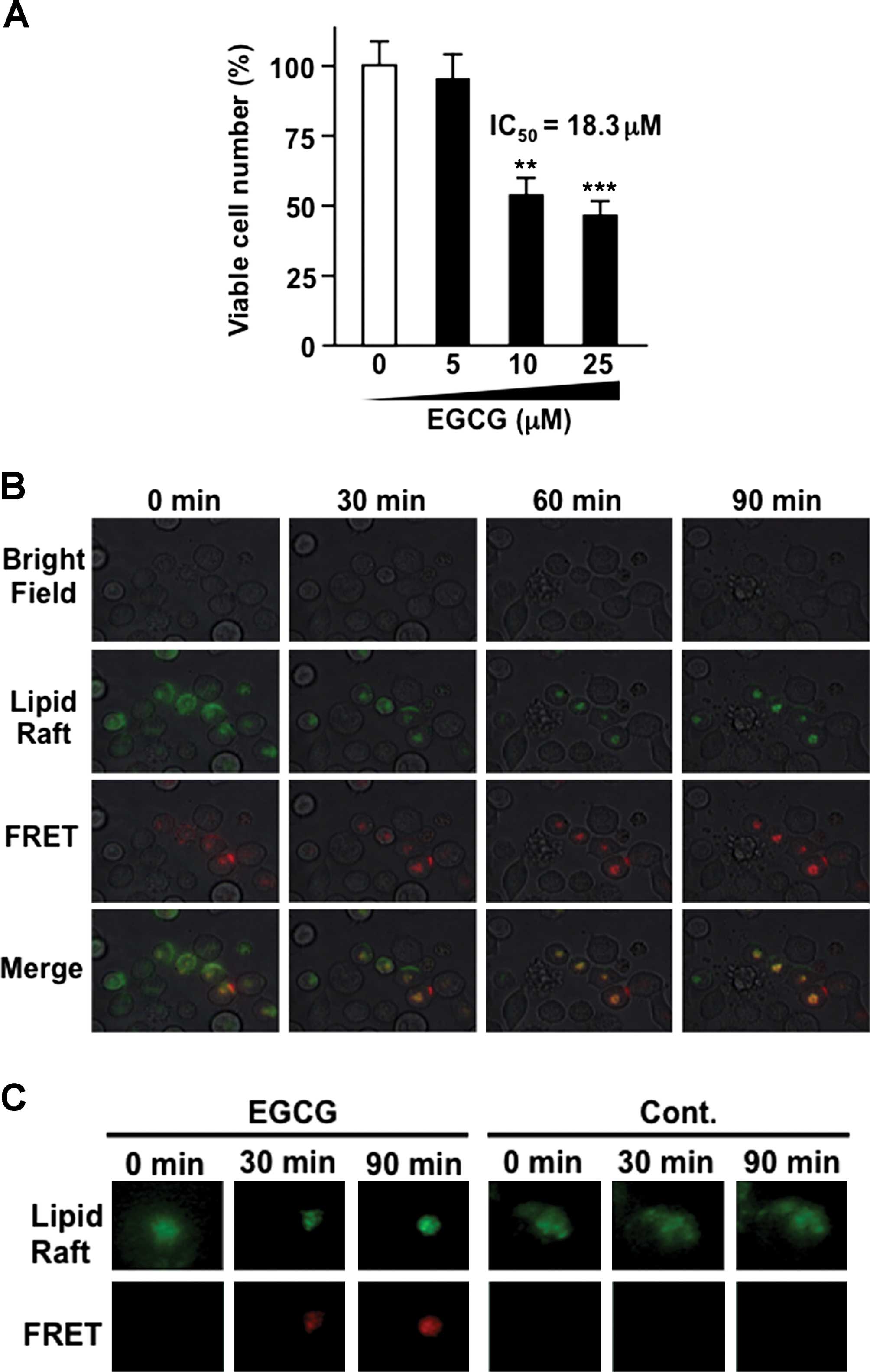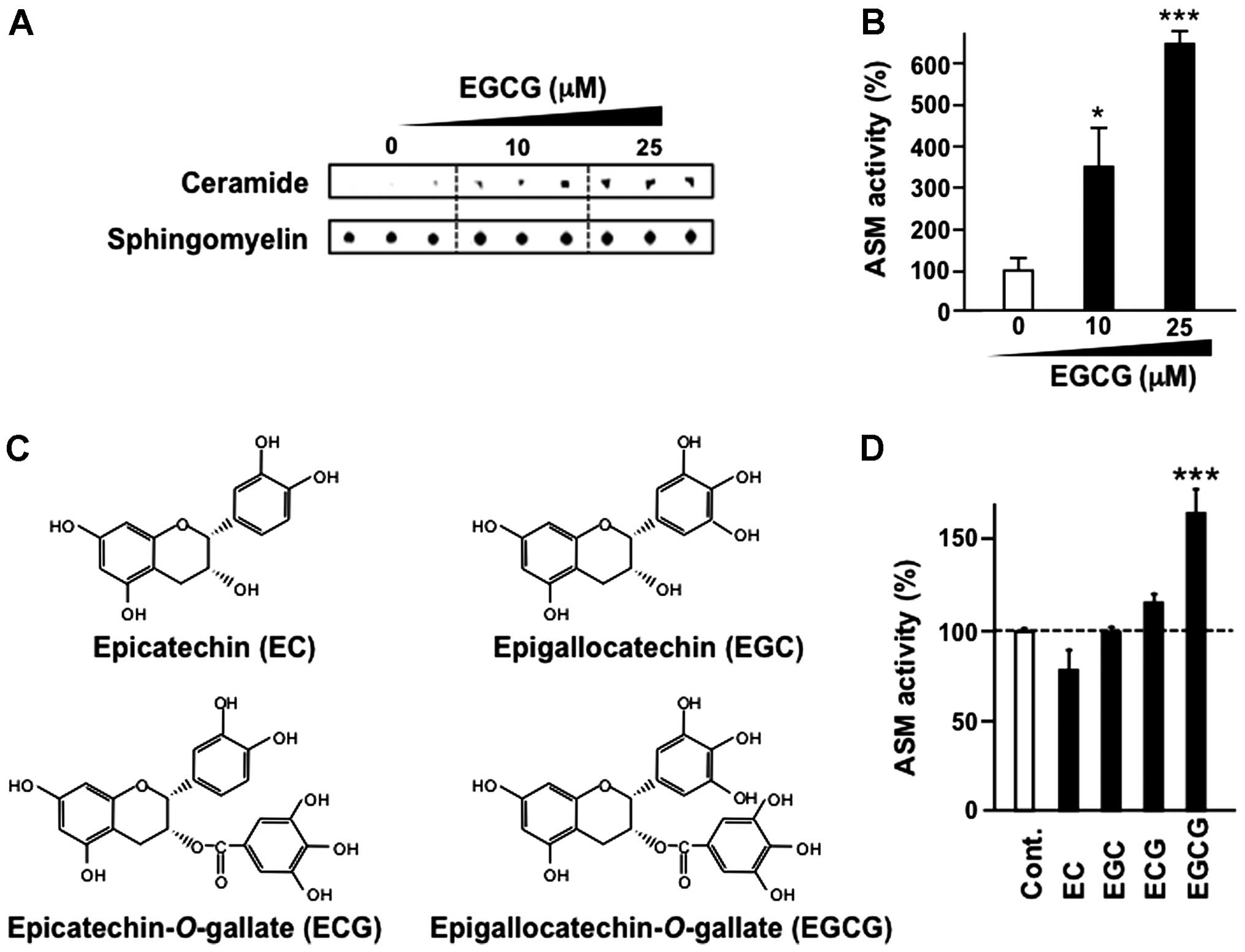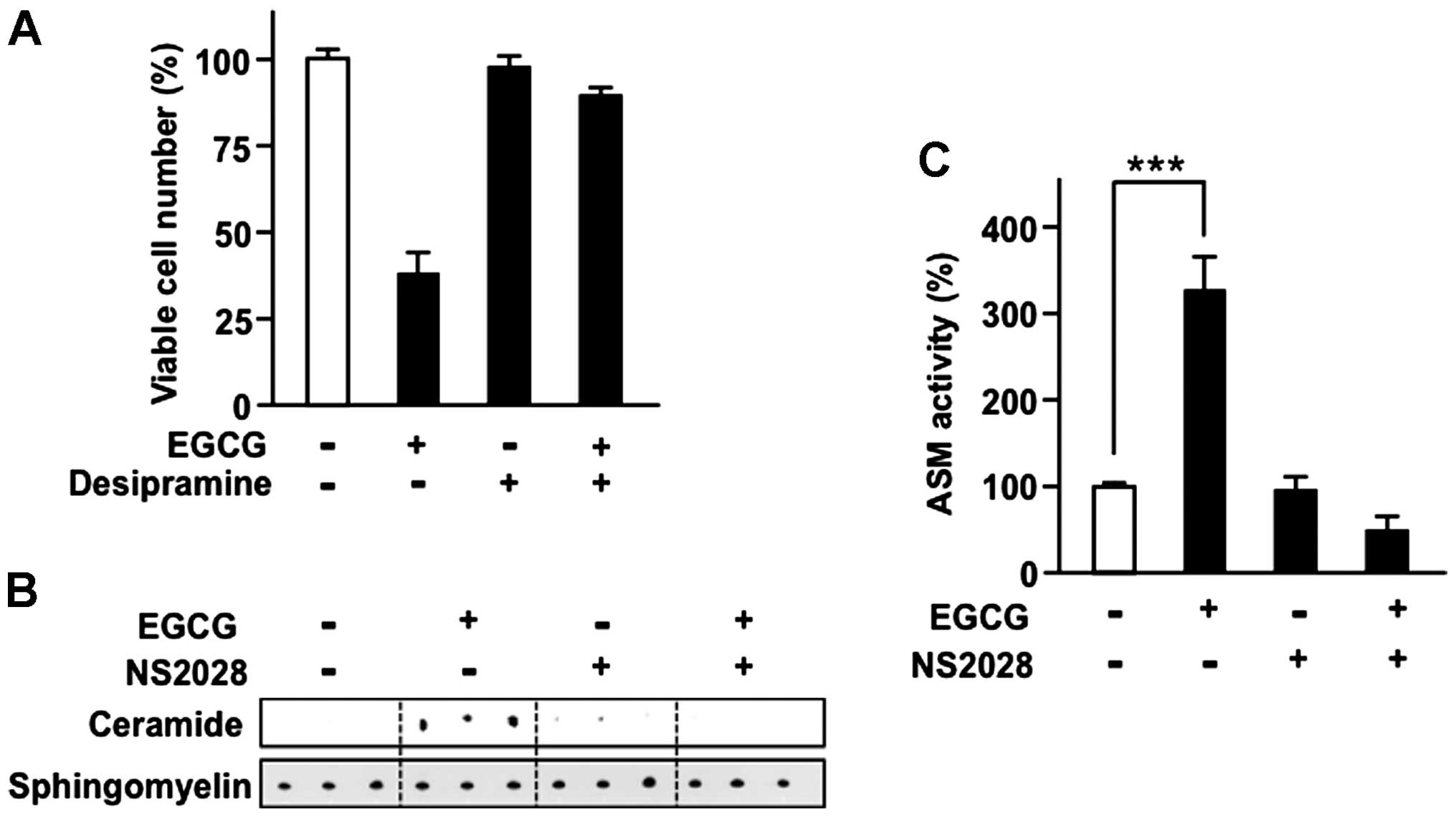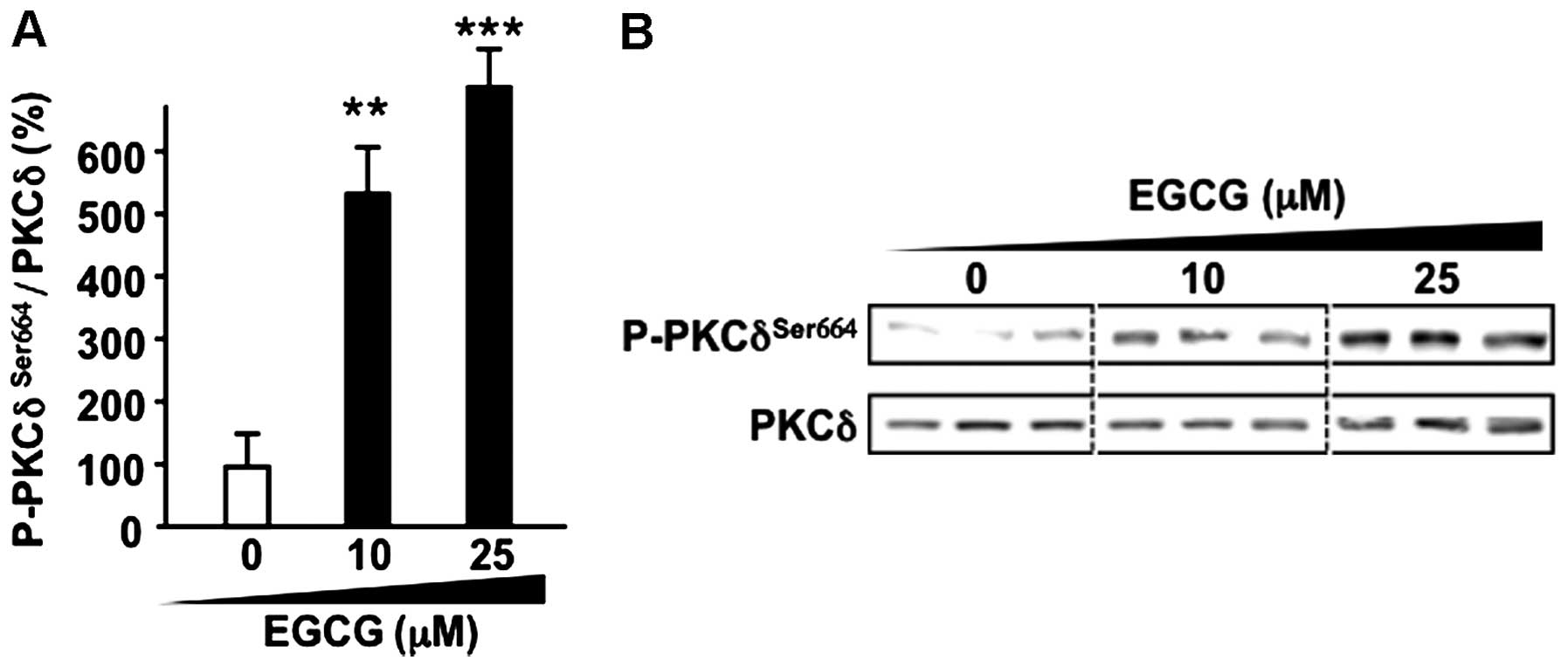|
1
|
Apperley JF: Chronic myeloid leukaemia.
Lancet. 385:1447–1459. 2015. View Article : Google Scholar
|
|
2
|
Hehlmann R, Hochhaus A and Baccarani M;
European LeukemiaNet: Chronic myeloid leukaemia. Lancet.
370:342–350. 2007. View Article : Google Scholar : PubMed/NCBI
|
|
3
|
Druker BJ, Tamura S, Buchdunger E, Ohno S,
Segal GM, Fanning S, Zimmermann J and Lydon NB: Effects of a
selective inhibitor of the Abl tyrosine kinase on the growth of
Bcr-Abl positive cells. Nat Med. 2:561–566. 1996. View Article : Google Scholar : PubMed/NCBI
|
|
4
|
Druker BJ, Talpaz M, Resta DJ, Peng B,
Buchdunger E, Ford JM, Lydon NB, Kantarjian H, Capdeville R,
Ohno-Jones S, et al: Efficacy and safety of a specific inhibitor of
the BCR-ABL tyrosine kinase in chronic myeloid leukemia. N Engl J
Med. 344:1031–1037. 2001. View Article : Google Scholar : PubMed/NCBI
|
|
5
|
Zhao C, Chen A, Jamieson CH, Fereshteh M,
Abrahamsson A, Blum J, Kwon HY, Kim J, Chute JP, Rizzieri D, et al:
Hedgehog signalling is essential for maintenance of cancer stem
cells in myeloid leukaemia. Nature. 458:776–779. 2009. View Article : Google Scholar : PubMed/NCBI
|
|
6
|
Perl A and Carroll M: BCR-ABL kinase is
dead; long live the CML stem cell. J Clin Invest. 121:22–25. 2011.
View Article : Google Scholar :
|
|
7
|
Zhang M, Zhao X, Zhang X and Holman CD:
Possible protective effect of green tea intake on risk of adult
leukaemia. Br J Cancer. 98:168–170. 2008. View Article : Google Scholar
|
|
8
|
Kuo YC, Yu CL, Liu CY, Wang SF, Pan PC, Wu
MT, Ho CK, Lo YS, Li Y and Christiani DC; Kaohsiung Leukemia
Research Group: A population-based, case-control study of green tea
consumption and leukemia risk in southwestern Taiwan. Cancer Causes
Control. 20:57–65. 2009. View Article : Google Scholar
|
|
9
|
Naganuma T, Kuriyama S, Kakizaki M, Sone
T, Nakaya N, Ohmori-Matsuda K, Hozawa A, Nishino Y and Tsuji I:
Green tea consumption and hematologic malignancies in Japan: The
Ohsaki study. Am J Epidemiol. 170:730–738. 2009. View Article : Google Scholar : PubMed/NCBI
|
|
10
|
Shanafelt TD, Call TG, Zent CS, Leis JF,
LaPlant B, Bowen DA, Roos M, Laumann K, Ghosh AK, Lesnick C, et al:
Phase 2 trial of daily, oral polyphenon E in patients with
asymptomatic, Rai stage 0 to II chronic lymphocytic leukemia.
Cancer. 119:363–370. 2013. View Article : Google Scholar
|
|
11
|
Hoy SM: Polyphenon E 10% ointment: In
immunocompetent adults with external genital and perianal warts. Am
J Clin Dermatol. 13:275–281. 2012. View Article : Google Scholar : PubMed/NCBI
|
|
12
|
Yang CS, Lambert JD, Ju J, Lu G and Sang
S: Tea and cancer prevention: Molecular mechanisms and human
relevance. Toxicol Appl Pharmacol. 224:265–273. 2007. View Article : Google Scholar : PubMed/NCBI
|
|
13
|
Britschgi A, Simon HU, Tobler A, Fey MF
and Tschan MP: Epigallocatechin-3-gallate induces cell death in
acute myeloid leukaemia cells and supports all-trans retinoic
acid-induced neutrophil differentiation via death-associated
protein kinase 2. Br J Haematol. 149:55–64. 2010. View Article : Google Scholar : PubMed/NCBI
|
|
14
|
Kumazoe M, Sugihara K, Tsukamoto S, Huang
Y, Tsurudome Y, Suzuki T, Suemasu Y, Ueda N, Yamashita S, Kim Y, et
al: 67-kDa laminin receptor increases cGMP to induce
cancer-selective apoptosis. J Clin Invest. 123:787–799.
2013.PubMed/NCBI
|
|
15
|
Shammas MA, Neri P, Koley H, Batchu RB,
Bertheau RC, Munshi V, Prabhala R, Fulciniti M, Tai YT, Treon SP,
et al: Specific killing of multiple myeloma cells by
(-)-epigallocat-echin-3-gallate extracted from green tea: Biologic
activity and therapeutic implications. Blood. 108:2804–2810. 2006.
View Article : Google Scholar : PubMed/NCBI
|
|
16
|
Kumazoe M, Tsukamoto S, Lesnick C, Kay NE,
Yamada K, Shanafelt TD and Tachibana H: Vardenafil, a clinically
available phosphodiesterase inhibitor, potentiates the killing
effect of EGCG on CLL cells. Br J Haematol. 168:610–613. 2015.
View Article : Google Scholar
|
|
17
|
Leone M, Zhai D, Sareth S, Kitada S, Reed
JC and Pellecchia M: Cancer prevention by tea polyphenols is linked
to their direct inhibition of antiapoptotic Bcl-2-family proteins.
Cancer Res. 63:8118–8121. 2003.PubMed/NCBI
|
|
18
|
Nakazato T, Ito K, Ikeda Y and Kizaki M:
Green tea component, catechin, induces apoptosis of human malignant
B cells via production of reactive oxygen species. Clin Cancer Res.
11:6040–6049. 2005. View Article : Google Scholar : PubMed/NCBI
|
|
19
|
Lee YK, Bone ND, Strege AK, Shanafelt TD,
Jelinek DF and Kay NE: VEGF receptor phosphorylation status and
apoptosis is modulated by a green tea component,
epigallocatechin-3-gallate (EGCG), in B-cell chronic lymphocytic
leukemia. Blood. 104:788–794. 2004. View Article : Google Scholar : PubMed/NCBI
|
|
20
|
Pike LJ: The challenge of lipid rafts. J
Lipid Res. 50(Suppl): S323–S328. 2009. View Article : Google Scholar :
|
|
21
|
Rebillard A, Tekpli X, Meurette O, Sergent
O, LeMoigne-Muller G, Vernhet L, Gorria M, Chevanne M, Christmann
M, Kaina B, et al: Cisplatin-induced apoptosis involves membrane
fluidification via inhibition of NHE1 in human colon cancer cells.
Cancer Res. 67:7865–7874. 2007. View Article : Google Scholar : PubMed/NCBI
|
|
22
|
Tsukamoto S, Hirotsu K, Kumazoe M, Goto Y,
Sugihara K, Suda T, Tsurudome Y, Suzuki T, Yamashita S, Kim Y, et
al: Green tea polyphenol EGCG induces lipid-raft clustering and
apoptotic cell death by activating protein kinase Cδ and acid
sphingomyelinase through a 67 kDa laminin receptor in multiple
myeloma cells. Biochem J. 443:525–534. 2012. View Article : Google Scholar : PubMed/NCBI
|
|
23
|
VanBeek DB, Zwier MC, Shorb JM and Krueger
BP: Fretting about FRET: Correlation between kappa and R. Biophys
J. 92:4168–4178. 2007. View Article : Google Scholar : PubMed/NCBI
|
|
24
|
Tachibana H: Green tea polyphenol sensing.
Proc Jpn Acad Ser B Phys Biol Sci. 87:66–80. 2011. View Article : Google Scholar : PubMed/NCBI
|
|
25
|
Micheau O, Solary E, Hammann A and
Dimanche-Boitrel MT: Fas ligand-independent, FADD-mediated
activation of the Fas death pathway by anticancer drugs. J Biol
Chem. 274:7987–7992. 1999. View Article : Google Scholar : PubMed/NCBI
|
|
26
|
Tachibana H, Koga K, Fujimura Y and Yamada
K: A receptor for green tea polyphenol EGCG. Nat Struct Mol Biol.
11:380–381. 2004. View
Article : Google Scholar : PubMed/NCBI
|
|
27
|
Umeda D, Tachibana H and Yamada K:
Epigallocatechin-3-O- gallate disrupts stress fibers and the
contractile ring by reducing myosin regulatory light chain
phosphorylation mediated through the target molecule 67 kDa laminin
receptor. Biochem Biophys Res Commun. 333:628–635. 2005. View Article : Google Scholar : PubMed/NCBI
|
|
28
|
Umeda D, Yano S, Yamada K and Tachibana H:
Green tea poly-phenol epigallocatechin-3-gallate signaling pathway
through 67-kDa laminin receptor. J Biol Chem. 283:3050–3058. 2008.
View Article : Google Scholar
|
|
29
|
Tsukamoto S, Huang Y, Umeda D, Yamada S,
Yamashita S, Kumazoe M, Kim Y, Murata M, Yamada K and Tachibana H:
67-kDa laminin receptor-dependent protein phosphatase 2A (PP2A)
activation elicits melanoma-specific antitumor activity overcoming
drug resistance. J Biol Chem. 289:32671–32681. 2014. View Article : Google Scholar : PubMed/NCBI
|
|
30
|
Humphries MJ, Limesand KH, Schneider JC,
Nakayama KI, Anderson SM and Reyland ME: Suppression of apoptosis
in the protein kinase Cdelta null mouse in vivo. J Biol Chem.
281:9728–9737. 2006. View Article : Google Scholar : PubMed/NCBI
|
|
31
|
Hung JH, Lu YS, Wang YC, Ma YH, Wang DS,
Kulp SK, Muthusamy N, Byrd JC, Cheng AL and Chen CS: FTY720 induces
apoptosis in hepatocellular carcinoma cells through activation of
protein kinase C delta signaling. Cancer Res. 68:1204–1212. 2008.
View Article : Google Scholar : PubMed/NCBI
|
|
32
|
Yang CS, Wang X, Lu G and Picinich SC:
Cancer prevention by tea: Animal studies, molecular mechanisms and
human relevance. Nat Rev Cancer. 9:429–439. 2009. View Article : Google Scholar : PubMed/NCBI
|
|
33
|
Kumazoe M, Kim Y, Bae J, Takai M, Murata
M, Suemasu Y, Sugihara K, Yamashita S, Tsukamoto S, Huang Y, et al:
Phosphodiesterase 5 inhibitor acts as a potent agent sensitizing
acute myeloid leukemia cells to 67-kDa laminin receptor-dependent
apoptosis. FEBS Lett. 587:3052–3057. 2013. View Article : Google Scholar : PubMed/NCBI
|
|
34
|
Simons K and Toomre D: Lipid rafts and
signal transduction. Nat Rev Mol Cell Biol. 1:31–39. 2000.
View Article : Google Scholar
|
|
35
|
Adachi S, Nagao T, Ingolfsson HI, Maxfield
FR, Andersen OS, Kopelovich L and Weinstein IB: The inhibitory
effect of (-)-epigallocatechin gallate on activation of the
epidermal growth factor receptor is associated with altered lipid
order in HT29 colon cancer cells. Cancer Res. 67:6493–6501. 2007.
View Article : Google Scholar : PubMed/NCBI
|
|
36
|
Patra SK, Rizzi F, Silva A, Rugina DO and
Bettuzzi S: Molecular targets of (−)-epigallocatechin-3-gallate
(EGCG): Specificity and interaction with membrane lipid rafts. J
Physiol Pharmacol. 59(Suppl 9): S217–S235. 2008.
|
|
37
|
Jenkins RW, Canals D and Hannun YA: Roles
and regulation of secretory and lysosomal acid sphingomyelinase.
Cell Signal. 21:836–846. 2009. View Article : Google Scholar : PubMed/NCBI
|


















